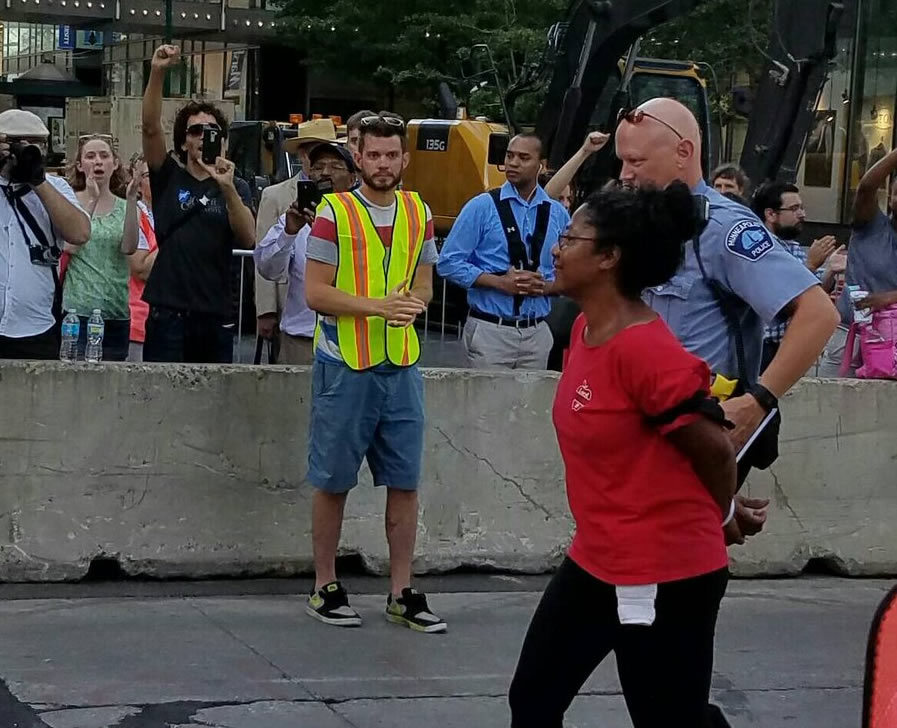

Share
Trust educators to clarify the complex issues of institutionalized racism and economic justice. That’s just what happened Tuesday in downtown Minneapolis – through both words and action.
Joined by parents, other union members and community activists, Minneapolis and St. Paul teachers led hundreds of delegates to the American Federation of Teachers annual convention in a march through rush hour traffic to demand racial and economic justice.
Twenty-one people, including several teachers, were arrested in a civil disobedience action outside the offices of US Bank. At the same time, they spoke out about the connections between corporate power and community safety.
Demonstrators chanted, “We want justice, we want peace, from the schools to the streets!”
They carried signs reading “Teachers4blacklives” and “Justice for Philando,” referring to Philando Castile, an African-American school cafeteria supervisor killed July 6 after his car was stopped by police in Falcon Heights.
“Today we march to remember Philando Castile, our student, our co-worker, our union brother,” said Kimberly Colbert, secretary of the Saint Paul Federation of Teachers.
“Mr. Phil, as the students of J. J. Hill elementary called him, was gunned down and murdered on a routine traffic stop. The killing must stop. But it won’t stop until we get to the root cause of these deaths, a racist system, which not only harms and kills, but which profits from that harm.”
To drive home that point, marchers walked from the Minneapolis Convention Center, site of the AFT convention, to U.S. Bank, where they called on banks to stop profiting from state-sanctioned violence and invest in community-driven solutions.
“It is time to demand that financial institutions like U.S. Bank and Wells Fargo stop profiting off the lives of people of color,” said Michelle Wiese, president of the Minneapolis Federation of Teachers.
“Aggressive policing practices have led to lawsuits from victims and their families. When cities cannot afford to pay these lawsuits, it is the banks that cover the bonds used to pay victims. Wealthy individuals and corporations become investors – investors who make a profit. Cities pay large fees to the banks that issue the bonds. This process steals money that belongs to our schools and our communities.”
U.S. Bank and Wells Fargo have both provided significant financing to private prisons, including the largest for-profit prison operator in the country, Corrections Corporation of America. Both banks have engaged in predatory payday lending and were major players in the mortgage crisis.
The deaths of Castile and many other African-Americans at the hands of law enforcement are terrible, said Michael Brunson, recording secretary of the Chicago Teachers Union, but “the highest and the most sophisticated form of violence is the impoverishment of a community.”
Educators cannot stand by as schools – and entire communities – are undermined, the marchers said.
“This moment, when the voices of educators and clergy, and the voices of black people across the country, are demanding change,” said Wiese. “Now, more than ever, we must speak out – and clearly – about ending systems of oppression.”
Organizers of the march reported Tuesday evening that all 21 individuals arrested during the march were ticketed and released.

